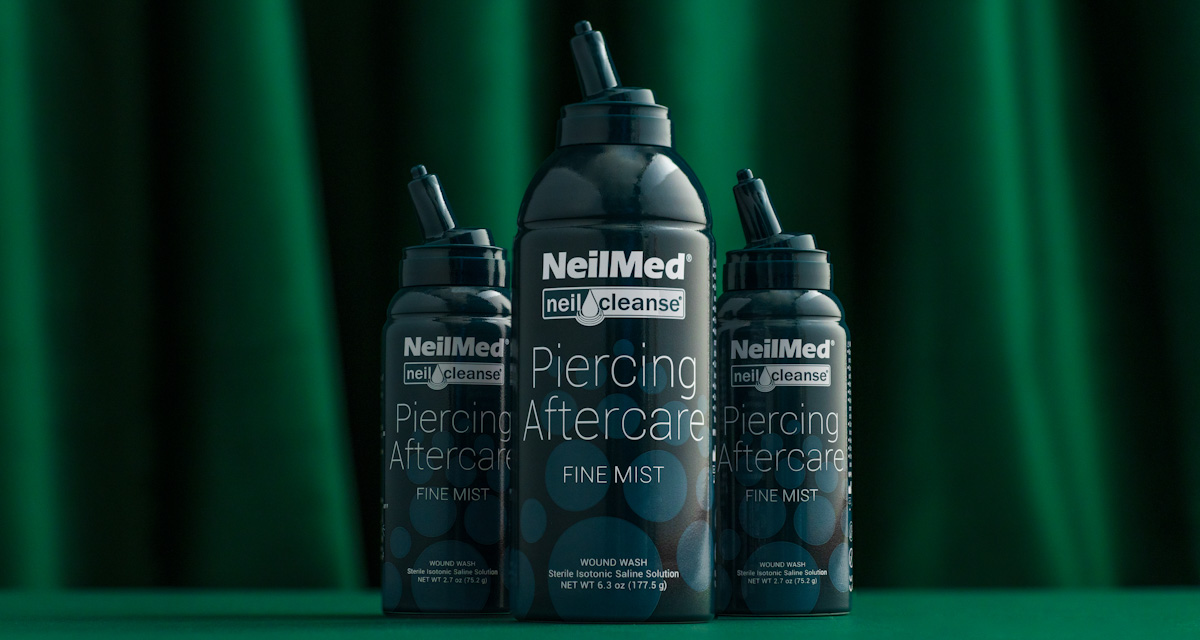There are soo many piercing aftercare products out there. And a lot of bad advice on the internet. That’s why it's crucial to be informed before shopping. If a product promises quick healing or miraculous results, it's too good to be true. Healing a piercing takes time. No magical product can heal your piercing in three weeks or remove complications like keloids or piercing bumps. Patience, proper care, and dedication are all that’s needed. Rather than falling for misleading claims, stick to tried-and-true aftercare practices recommended by professional piercers.
With that, we are here to say- if it involves any of these, skip it!
Ingredients: Hydrogen Peroxide and Alcohol
Why should it be avoided? Yes, they used to say these things were ok to clean your piercings with, and you will probably find many "piercing aftercare" products with them in it. While they may be effective for cleaning cuts and scrapes they are too harsh for piercings. Both products can damage new healthy skin cells that are helping your piercing heal! Using these products actually delays healing and increases the risk of irritation and infection.
Product: Bactine®
Why should it be avoided? This one is popular. Clients ask all the time if this is a product they can use. Unfortunately, similar to peroxide and alcohol, Bactine’s harshness and potential to disrupt the healing process make it a no-go product. Bactine contains the ingredients lidocaine and benzalkonium chloride, which can cause irritation, burning, and allergic reactions. The product and the website both state it is not for use on puncture wounds (Which is what a piercing is). See the Bactine FAQ here https://bactine.com/faqs/
Ingredient: Tea Tree Oil
Why should it be avoided? Another popular choice, courtesy of the internet, is tea tree oil. Tea tree oil is used as a natural antiseptic and in skin care to help fight acne and reduce inflammation. Despite its popularity, there's little proof that it helps piercings heal better, treat piercing bumps, or prevent infections. Applying undiluted tea tree oil directly to the skin can lead to adverse effects such as irritation, dryness, and even burning. I know your friend swears by it, but I assure you, it's not worth the risk!
Product: Polysporin®
Why should it be avoided? Ointments like Polysporin and other petroleum-based products create a barrier over the piercing site. This barrier traps bacteria and prevents airflow, slowing down the healing process.
Ingredients: Jojoba, Grapeseed and Other Oils
Why should it be avoided? Similar to Polysporin, oils like these are thick and create a barrier over the piercing. The moist environment created by these oils can promote bacterial growth, increasing the risk of infection.
Ingredient: Herbs! Clove, Rosemary, and Tumeric
Why should it be avoided? While these are all beneficial in specific contexts, they can also irritate or cause infection in a new piercing. The most popular is turmeric, which has anti-inflammatory properties and is often an ingredient in skincare products. So we get WHY people think it might work, but applying any of these products can cause irritation, and the turmeric will stain your skin yellow.
What You Should Use Instead:
When it comes to piercing aftercare, less is more. Avoid harsh or unnecessary products and ingredients that can do more harm than good. For body piercings, stick to sterile saline solution- which should just be TWO ingredients-sterile water and sodium chloride. Along with saline, we suggest a gentle cleanser for in the shower. For oral piercings, a saline solution or a plain alcohol-free mouthwash will do the trick.

Ingredients: Sodium Chloride and Sterile Water
Why We Like It: Sodium chloride, commonly known as salt, is a natural compound with mild antiseptic properties, which makes it effective in preventing bacterial growth. When used in saline, the sterile water dissolves the salt to create a solution with the appropriate concentration of salt to water. The final product provides gentle cleansing without causing irritation or damage to the healing tissue.
To Conclude...
By using aftercare products formulated with ingredients known for their wound-healing properties, you can optimize the healing process and reduce the risk of complications. Remember, there are no shortcuts! Especially when it comes to caring for your piercing, being patient and consistent will help you achieve the best results.
What’s the strangest aftercare product you’ve seen or tried? Comment below.
